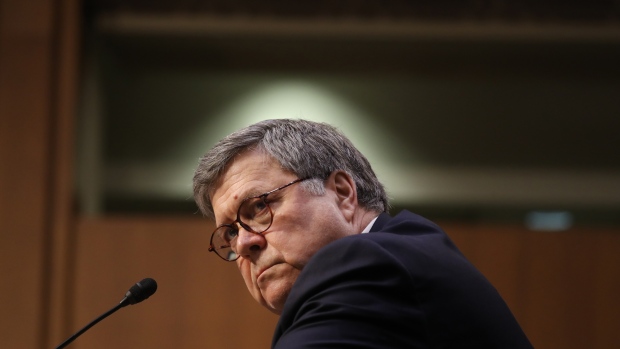Mar 22, 2019
Trump Readies for Aftermath of Still-Secret Mueller Probe Report
, Bloomberg News

(Bloomberg) -- President Donald Trump was on the phone with German Chancellor Angela Merkel at his Mar-a-Lago resort in Florida as the moment he’d been awaiting 22 months for arrived: Robert Mueller had closed his Russia investigation and was planning no further indictments.
That development on Friday afternoon brought an end to an investigation that has weighed deeply on the president since the early months of his administration. But Trump has little control over what happens next, a difficult test for a famously impatient leader.
Attorney General William Barr told lawmakers he will review the report and may notify Congress as soon as this weekend on Mueller’s principal conclusions.
For now, the White House is being left out of those deliberations, giving the president’s lawyers little to do but wait despite their efforts over past months to game-plan responses to any bad news from Mueller’s findings.
White House Press Secretary Sarah Huckabee Sanders said in a tweet that the next steps are up to Barr and that the White House hadn’t received the special counsel’s report or been briefed on it. White House lawyer Emmet Flood learned that the report was complete from Barr’s chief of staff, Brian Rabbitt, who read the attorney general’s letter sent to Congress over the phone.
As head of the executive branch, the president could demand that Barr confide what’s in the report. Yet that would carry the political and legal risk that Trump could be seen as trying to suppress the report or to censor what Barr will tell Congress and the public about what’s in it.
Still, Barr may have to inform the White House at some point before disclosing certain details. Trump could assert executive privilege to protect any confidential discussions from disclosure.
Democrats, who have already accused Trump of obstruction of justice, could challenge claims of executive privilege in court and cite them as more evidence for a potential move to impeach him.
But releasing details about the inner workings of his White House -- even if they’re embarrassing but not incriminating -- may be a step too far for a president who’s spent two years denouncing an investigation that he routinely called a “witch hunt.”
Trump has said publicly that he’ll leave the decision of what to make public up to Barr -- whom he nominated and who has long held an expansive view of presidential power.
Trump lawyer Rudy Giuliani has said the president’s legal team will wait and see before they determine their next moves, letting Barr determine his next steps.
Aside from demanding an opportunity to assert executive privilege over any confidential deliberations, Trump’s lawyers have crafted their own rebuttal report to counter any criticism from Mueller. They’ve suggested they may insist on issuing both reports simultaneously.
Democrats in Congress already have said a summary from Barr won’t satisfy them. They’ve vowed to issue subpoenas for all of the evidence gathered by the special counsel, and for Mueller to testify to Congress if needed.
Among the arguments the White House could make against such subpoenas is that the report is an internal Justice Department document that includes information on individuals who weren’t indicted and was never intended to be made public.
Were such a report to be released widely, the White House will argue, it could set a bad precedent for future presidents and investigators.
--With assistance from Jennifer Jacobs.
To contact the reporter on this story: Shannon Pettypiece in Washington at spettypiece@bloomberg.net
To contact the editors responsible for this story: Alex Wayne at awayne3@bloomberg.net, Larry Liebert, John Harney
©2019 Bloomberg L.P.







